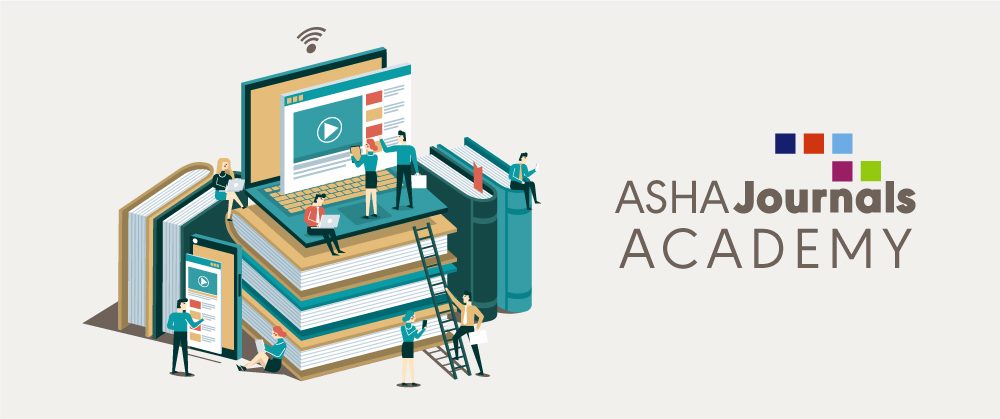Every year, thousands of authors contribute to ASHA’s journals. Whether you’re planning to report your research, develop a clinical focus or tutorial, or share a viewpoint, the ASHA Journals Academy has tools to help you get started.
The Academy provides authors, reviewers, and editors with detailed guidance and access to so many tools—from reporting guidelines to promoting your published article on social media—at all stages of the process. Whether you’re new to ASHA Journals or have published with us before, these resources answer questions that might arise at every stage in the process. And, if you’re an author or a potential author, one such tool is the Author Resource Center.
New to ASHA’s Journals? Start Here
Because it plays such a pivotal role in providing important information to help you select a journal and prepare your manuscript, the Author Resource Center is the place to start. There, you’ll find descriptions of each of our five journals so you can narrow down which publication is best suited to your work. Then, the journals’ author guidelines offer tips on how to write and format your paper.
We also list key information—our authorship criteria, ethical policies, and more—all in one place, so you can ensure your paper meets our standards before you submit it for publication. We even offer a free automated check to walk you through any potential issues and predict if your paper meets the submission requirements through our partnership with Paperpal Preflight. More features, such as grammar and language checks, are available for a small fee.
While you’re focused on finalizing your manuscript, you may have other questions about the submission and peer review process. The ASHA Journals Academy provides a step-by-step timeline of the peer review process so you know what to expect while your paper is being reviewed.
Research Data Standards and Data Availability Statements
Stay on top of current trends by publishing with ASHA Journals. We’ve implemented Transparency and Openness Promotion (TOP) guidelines, supported the submission of preprints, provided authors with a number of open access options for their articles, and started offering open science badges for eligible new articles.
In keeping with these goals, we expect, but do not require, authors to share their data to increase transparency and reproducibility in the sciences. You can learn more about what this means for you as an author on our Research Data Standards page.
Whether or not you choose to share data, we require data availability statements as part of our research data standards. The Research Data Standards page provides templates that you can use to keep your data availability statement clear and concise while you focus on other aspects of your research.
More Help With Editage
If writing your manuscript isn’t going as smoothly as you’d hoped, you can access additional help through the ASHA Journals Academy. ASHA, through its collaboration with Editage, offers editing services to help authors maximize quality, visibility, use, and understanding of their research. They can even add graphics to help your paper stand out.
ASHA’s journals have a global reach with a rich history of international authors. In addition to the services mentioned above, Editage offers translation services as well as English editing services for non-native English speakers.
Visit the ASHA Journals Academy Today!
We’ve highlighted just a fraction of the tools that both new and experienced authors can access on the ASHA Journals Academy. Check out our Author Resource Center to help answer any questions you may have while writing or submitting your work.
We’d like to thank everyone who contributes to ASHA’s journals for their commitment to expanding the sciences and helping ASHA members around the country. Wherever you’re at in your publishing journey, you can find the latest information at the ASHA Journals Academy!







